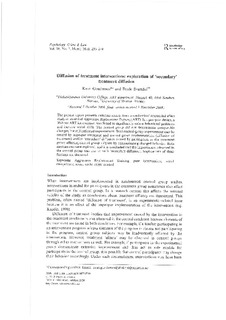| dc.contributor.author | Gundersen, Knut | |
| dc.contributor.author | Svartdal, Frode | |
| dc.date.accessioned | 2014-01-13T08:22:21Z | |
| dc.date.available | 2014-01-13T08:22:21Z | |
| dc.date.issued | 2010 | |
| dc.identifier.issn | 1477-2744 | |
| dc.identifier.uri | http://hdl.handle.net/11250/99045 | |
| dc.description.abstract | The present report presents outcome results from a randomized controlled effect study on extended Aggression Replacement Training (ART). In a pre–post design, a 30-hour ART intervention was found to significantly reduce behavioral problems and increase social skills. The control group did not demonstrate comparable changes, but still indicated improvement. Such control-group improvement may be caused by improper treatment and control group implementation (diffusion of treatment) and/or ‘secondary’ diffusion caused by participants in the treatment group affecting control group subjects by demonstrating changed behavior. Both mechanisms were explored, and it is concluded that the improvement observed in the control group was due to such ‘secondary diffusion’. Implications of these findings are discussed. | no_NO |
| dc.language.iso | eng | no_NO |
| dc.publisher | Taylor & Francis | no_NO |
| dc.subject | Aggression Replacement Training | no_NO |
| dc.subject | peer intervention | no_NO |
| dc.subject | social competence | no_NO |
| dc.subject | social skills | no_NO |
| dc.subject | anger control | no_NO |
| dc.subject | ART | no_NO |
| dc.title | Diffusion of treatment interventions: exploration of ‘secondary’ treatment diffusion | no_NO |
| dc.type | Journal article | no_NO |
| dc.type | Peer reviewed | no_NO |
| dc.source.pagenumber | s. 233-249 | no_NO |
| dc.source.volume | 16 | no_NO |
| dc.source.journal | Psychology, crime & law | no_NO |
| dc.source.issue | 3 | no_NO |
| dc.identifier.doi | 10.1080/10683160802612924 | |
